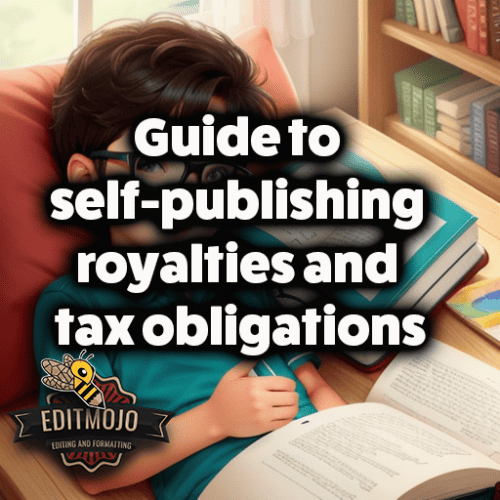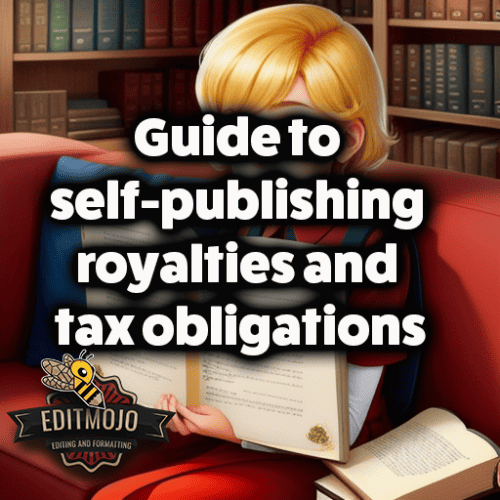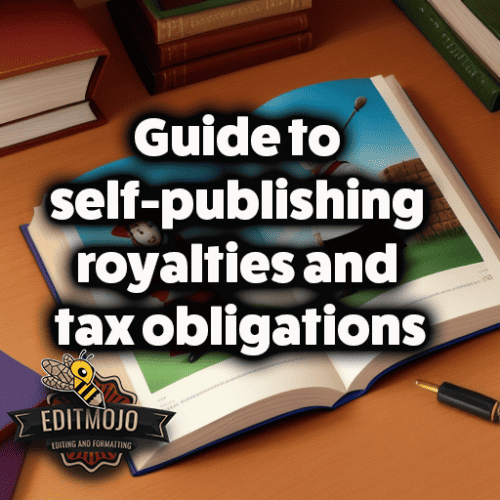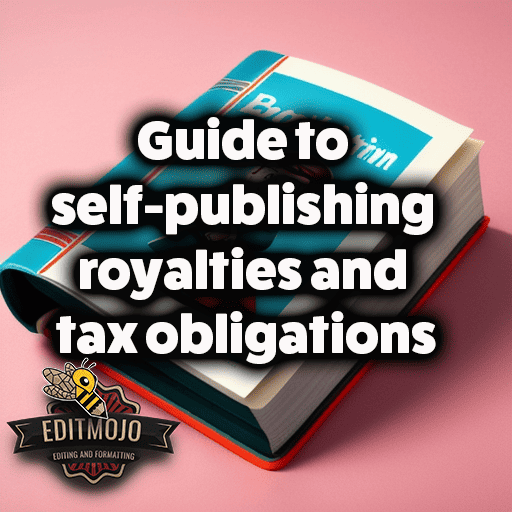Guide to self-publishing royalties and tax obligations
Guide to self-publishing royalties and tax obligation. The world of self-publishing can be incredibly rewarding, offering authors creative control, the freedom of choice, and the entire pie of profits. However, along with this empowerment comes the need to comprehend the somewhat complex domains of self-publishing royalties and tax obligations. This guide will serve as a comprehensive manual to navigate these waters. So, buckle up for an enlightening journey!
Key Takeaway Table:
| Sections | Key Takeaways |
|---|---|
| Understanding Self-Publishing Royalties | Royalties are payments received from each book sale. They vary based on the format (print, eBook, audiobook), publishing platform, retail price, and geography. |
| Tax Obligations in Self-Publishing | Self-publishing royalties are taxable. Your status (hobbyist vs professional), tax bracket, and geographical location can impact your tax obligations. |
| Record Keeping and Financial Management | Proper record keeping is crucial for effective financial management. Using bookkeeping tools and maintaining a separate business account can be beneficial. |
| Engaging Tax Professionals | Hiring a tax professional can help ensure tax law compliance, guide you about potential deductions, and simplify the tax filing process. |
| Self-Publishing Royalties and Taxes: Myth vs Reality | Not all authors become millionaires through self-publishing. All income, even if there’s no profit, must be reported to the IRS. |
II. Understanding Self-Publishing Royalties
1. Defining Royalties in the Context of Self-Publishing
First things first, let’s understand what we mean by ‘royalties’. In the self-publishing world, royalties are the payments you receive from each book sale. Unlike traditional publishing, where the author typically receives a smaller percentage of the profits, self-publishing allows you to keep the lion’s share, hence making understanding royalties essential.
2. Different Types of Royalties in Self-Publishing
Royalties can be grouped into three primary categories based on the format of your book: print, eBook, and audiobook royalties.
- Print royalties: These are earned from physical copies of your book sold. They’re typically lower than eBook royalties because of the costs involved in printing.
- eBook royalties: As eBooks involve no printing or shipping costs, royalties from eBook sales tend to be higher.
- Audiobook royalties: These royalties come from the sale of audiobook versions. This format has gained tremendous popularity, thanks to platforms like Audible.
3. Factors Influencing Royalty Rates
Royalty rates can vary based on several factors such as:
- Self-publishing platform: Different platforms like Amazon KDP, Barnes & Noble Press, or Smashwords offer different royalty rates.
- Retail price: The price at which you choose to sell your book can influence the royalty you receive.
- Book format: As discussed earlier, print, eBook, and audiobook formats attract different royalties.
- Geographical location of sales: The country in which your book is sold can also impact your royalty rate due to regional pricing and tax differences.

4. The Reality of Self-Publishing Royalties: What to Expect
Before you dive headfirst into self-publishing, remember that earning substantial royalties often requires a combination of good writing, strategic pricing, effective marketing, and sometimes, just pure luck. You may not become a millionaire overnight, but with hard work, your book can indeed become a steady source of income.
5. How to Calculate Self-Publishing Royalties: Practical Examples
Calculating your potential royalties can seem daunting. However, many self-publishing platforms offer royalty calculators, like the KDP Royalty Calculator, to help you understand your earnings based on price and format.
For example, let’s say you decide to sell your eBook on Amazon KDP for $9.99. With KDP, you can choose between a 35% or 70% royalty rate. If you select the 70% royalty rate, Amazon deducts a small delivery fee based on the file size of your eBook. After the deductions, you might receive approximately $6.50 per eBook sold.
6. Overview of Royalty Payment Methods and Schedules across Different Platforms
Understanding when and how you’ll receive your royalty payments is also crucial. For example, Amazon K
DP pays royalties approximately 60 days after the end of the calendar month in which the sale was made. However, note that payment methods vary, from direct deposit to checks or electronic funds transfer (EFT), and sometimes may depend on the country of your residence.

III. Tax Obligations in Self-Publishing
1. Basics of Income Tax for Self-Publishers
Just like any other income, self-publishing royalties are subject to income tax. Thus, understanding your tax obligations is vital to avoid any surprises during tax season. Remember, as a self-publisher, you’re essentially running a business.
2. Identifying Your Status: Hobbyist vs Professional Writer
How your writing income is taxed can depend on whether the IRS views your self-publishing as a business or a hobby. If you’re deemed a professional writer, you can deduct writing-related expenses. But if you’re classified as a hobbyist, deductions are limited.
3. How Royalties are Taxed: Understanding Your Tax Bracket
The tax rate applied to your royalty income can vary based on your overall taxable income, filing status, and the current tax laws. Understanding which tax bracket you fall into can help you estimate your tax obligations more accurately. The IRS Tax Bracket guide can provide a helpful starting point.
4. The Impact of Geography: Domestic and International Tax Obligations
Geography plays a crucial role in your tax obligations. If you’re based in the U.S., you’ll be subject to U.S. income tax laws. However, if you’re selling your book internationally, you might also be subject to withholding taxes in the countries where your books are sold.

5. Understanding Tax Forms Relevant to Self-Publishers
As a self-publisher, several tax forms may be relevant, like the W-9, W-8BEN, and the 1099-MISC. For instance, Amazon KDP uses Form 1099-MISC to report your royalty income to the IRS and to you.
6. Tax Deductions for Self-Publishers
Deductions can reduce your taxable income, potentially saving you money at tax time. Typical deductions for self-publishers include writing-related expenses like writing software, office supplies, and marketing costs. Remember, keep accurate records and receipts for all expenses.
IV. Importance of Record Keeping and Financial Management
Keeping good financial records is critical. Accurate and consistent record keeping simplifies tax filing, allows you to track your profits and losses, and provides valuable insights into your business. Consider using basic bookkeeping tools or even setting up a separate business account for your self-publishing endeavors.
V. Engaging Tax Professionals
While managing your taxes as a self-publisher can feel overwhelming, hiring a tax professional can alleviate some of the burdens. They can help ensure you’re compliant with tax laws, advise on potential deductions, and potentially save you a lot of headaches down the line.
VI. Self-Publishing Royalties and Taxes: Myth vs Reality
One common myth in self-publishing is that authors can easily become millionaires. While it’s possible, most authors earn modest income from their books.
When it comes to taxes, many authors believe they won’t owe taxes unless they make a profit. However, the IRS requires you to report all income, regardless of whether you made a profit.
VII. Conclusion (Guide to self-publishing royalties and tax obligation)
While self-publishing can indeed be a lucrative business or a rewarding hobby, understanding the intricacies of self-publishing royalties and tax obligations is key to your success. By being informed, you’ll be
better prepared to navigate this exciting journey.
VIII. Additional Resources
For further reading and more specific information, consider visiting the IRS Small Business and Self-Employed Tax Center, Amazon KDP Help Center, or the Author’s Guild Tax Guide.
Remember, the road to self-publishing success might be bumpy, but with due diligence and dedication, you can navigate it successfully. Good luck, and here’s to your self-publishing journey!
Top Five Questions and Answers:
Q1: How are self-publishing royalties calculated?
A: Royalties are calculated based on the retail price of your book, the chosen royalty rate, the book’s format, and the sales location. Each self-publishing platform provides detailed guidelines on royalty calculations.
Q2: Are self-publishing royalties taxable?
A: Yes, self-publishing royalties are considered income and therefore are taxable. The amount of tax you owe depends on your overall income, tax bracket, and location.
Q3: Can I claim tax deductions as a self-publisher?
A: Yes, if your self-publishing is classified as a business and not a hobby, you may be eligible to claim deductions for writing-related expenses. It’s recommended to consult with a tax professional to understand eligible deductions accurately.
Q4: Why is record-keeping important in self-publishing?
A: Proper record-keeping is crucial for tracking your profits and losses, understanding your financial growth, ensuring accurate tax filing, and identifying potential deductions.
Q5: Should I hire a tax professional for my self-publishing business?
A: While not mandatory, hiring a tax professional can be beneficial. They can help ensure tax compliance, provide guidance on tax obligations, and assist with potential deductions, making the tax filing process smoother.
